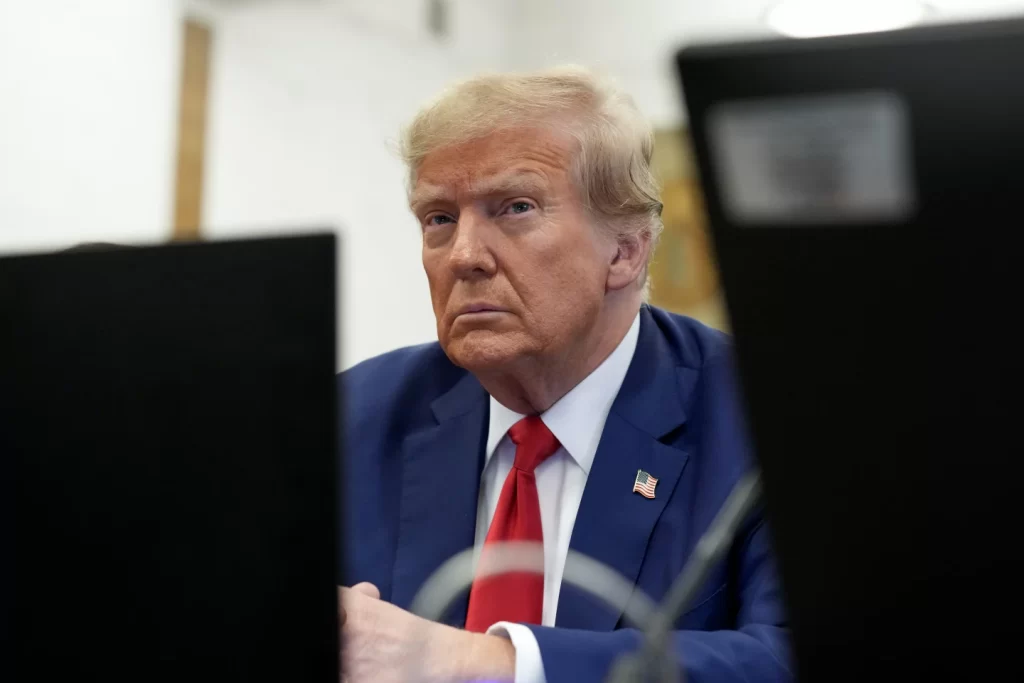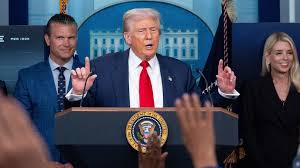
WASHINGTON — Donald Trump left the White House facing a cash crunch and a tattered reputation after his attempts to overturn the 2020 election, threatening the viability of his business empire. Soon, though, a new source stepped forward to provide a financial lifeline when many longtime lenders refused.
Over the past two years, Axos Bank, as well as its largest individual shareholder, California billionaire Don Hankey, have collectively extended more than $500 million in financing that has benefited Trump, records show. The cash influx has helped Trump to pay off debts and pocket a tidy profit while escaping from a lease on his money-losing former hotel in Washington.
It also covered a $175 million down payment he made this week on an eye-popping civil fraud penalty.
Axos Bank officials as well as Hankey have said that the deals offer them a financial upside.
But as Trump again pursues the White House, ethics and legal experts question what the lenders may ask in return if there’s a future Trump presidency, considering even small regulatory changes can translate into millions of dollars in earnings.
“If the guy gets back in the White House, they’ve got him over a barrel,” said Richard Painter, a former ethics lawyer for President George W. Bush who later ran for Senate in Minnesota as a Democrat.
Financial statements and court records detail how both Axos Bank and Hankey have faced heightened oversight under Democrats.
The Securities and Exchange Commission investigated Axos during Barack Obama’s presidency after a whistleblower filed a lawsuit accusing the bank of violating anti-money laundering rules, court records show. The investigation was closed in 2017 once Trump became president, while the whistleblower lawsuit was settled out of court.
Hankey, who made his fortune selling high-interest auto loans to those with bad credit histories, has faced similar scrutiny. In 2015, one of his companies, Westlake Services, was forced to pay $48 million in penalties and compensation after the Consumer Financial Protection Bureau — an agency created by Obama and often criticized by Trump administration officials — found that they used debt collection tactics that the bureau described as “illegal.”
Westlake also paid $700,000 to resolve a 2017 Justice Department lawsuit, which accused the company of illegally repossessing at least 70 vehicles owned by members of the military. While monitoring Westlake’s compliance with the settlement, the DOJ found the company had failed to grant service members an interest rate benefit required under law, leading to an additional $225,000 settlement in 2022, records show.
Hankey did not respond to requests for comment made directly to him, as well as to an attorney for his company. Trump’s campaign also did not respond to an inquiry. Officials for Axos, a midsized California-based bank that was formerly known as Bank of the Internet, did not address the SEC investigation in a brief statement.
In its statement, Axos Bank said it faced little risk from its lending to Trump, holding a “net principal balance exposure of less than $100 million.”
Axos CEO Gregory Garrabrants donated $4,800 to Trump’s campaign. But both the bank and Hankey have previously said that politics, or an affinity for Trump, had no bearing on their decision to lend him money.
Trump left the White House as a pariah in the business world following his efforts to overturn the 2020 election, which culminated in the Jan. 6 attack on the Capitol. He also faced looming deadlines to pay off massive loans taken out on Trump Tower as well as his Doral golf course resort in Miami.
Axos stepped up. The bank extended $225 million in loans to Trump in 2022, enabling him to pay off those two outstanding debts just as they were about to come due, records show.
When Trump was looking to exit his hotel lease of Washington’s historic Old Post Office building, the company again came through, providing a $190 million loan that helped a Miami-based investor group complete the $375 million sale in 2022, according to property records.
Axos said it provided the financing to backstop the primary lender in the deal, MSD Partners.
Many hotel brokers, owners and consultants did not expect the 263-room hotel down the street from the White House to fetch such a high price. The hotel lost more than $70 million during the four years of Trump’s presidency, including in each year before pandemic shutdowns. But when the sale closed Trump’s companies made as much as $100 million, the Associated Press reported at the time.
This week, the latest tranche of Axos-connected financing came through when Hankey stepped forward through one of his companies, Knight Specialty Insurance, to post a $175 million bond that Trump was required to post as he appeals a $454 million judgment in his New York civil fraud trial.
Hankey owns a roughly 5% stake in Axos Bank, making him the bank’s largest individual shareholder, according to financial filings made with the SEC.
“This is what we do at Knight Insurance, and we’re happy to do this for anyone who needs a bond,” said Hankey earlier this week after Trump made the bond. He previously told the AP that he has never met or spoken with Trump.
On Thursday, New York Attorney General Letitia James’ office objected to the bond in a court filing, requesting that Knight Insurance file additional paperwork showing that the company was financially sound and had adequate collateral to cover the amount.
Hankey, who donated $80,000 to Trump and the Republican Party in 2016, maintains politics did not influence his decision to offer help. He previously said Trump offered up both cash and bonds as collateral.
“I’m chairman of the board of several companies, and we just carry on our business and we try to stay away from political issues or taking sides,” Hankey told The Washington Post.
That offers little assurance to Trump critics who closely tracked the transactional nature of his presidency.
“There are multiple layers of questions about what is Hankey’s relationship to Trump and to others in Trump’s orbit,” said Norman Eisen, a former Obama “ethics czar” who is now senior fellow at the liberal-leaning Brookings Institution. “What are his interests? How might Trump favor his interests? How might others?”





